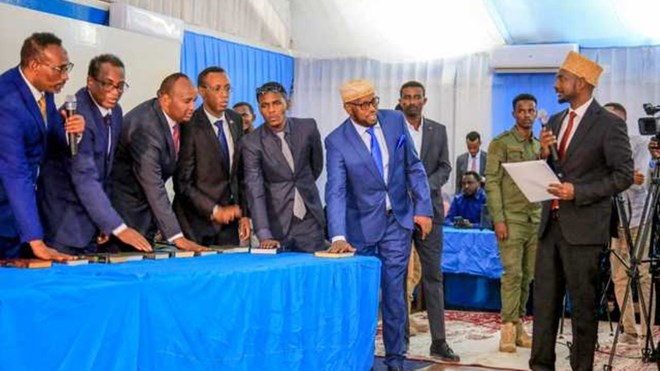
Saturday May 7, 2022
By AGGREY MUTAMBO, By ABDULKADIR KHALIF
Newly-elected deputies take oath after the Somalia parliamentary elections in Mogadishu. The May 15 presidential election is expected to be crowded. PHOTO | AFP
Somalia’s definitive polls date has exposed candidates to a new round of conditions, setting the stage for one of the toughest contests they will face to be cleared.
On Thursday, a special parliamentary task force chosen to prepare for the much-delayed elections settled on May 15 this year as the presidential elections date.
advertisements
The date coincides with Somalia’s Youth Day, a day Somalis say sowed the seed of independence demands back in 1943 when the Somali Youth League was formed.But this time, apart from offering certainty to an end of a prolonged electoral cycle, the date could also be giving candidates a headache.
The elections, initially scheduled for March 2021, have been delayed for more than a year, attracting more aspirants along the way. By Thursday, at least 15 candidates had expressed intent to contest.
According to the rules publicised by the task force, each candidate interested in the post of federal president will be required to register their candidacy between May 8 and 10. Those who fail to do so will be locked out.
So far, only one woman, former Foreign Minister Fawzia Yusuf Adam, has expressed intention.
After registration, the contestants will be required to address a joint session of the two chambers of parliament on May 11 and 12.
In Somalia’s bicameral federal legislature, the Upper House (Senate) has 54 members while Lower House has 275. These MPs sit in a joint session to vote for the president by secret ballot.
The candidates will will be required to pay $40,000 in registration fees. In 2012, a candidate was required to pay $10,000 when submitting an application letter. The amount rose to $50,000 in 2017. Critics have argued that the fees locks out suitable contenders at the expense of moneyed politicians.
But there are other conditions. Each presidential candidate must be proposed by a minimum of 20 legislators or at least one federal member state.
Somalia has five federal member states: Jubbaland, Puntland, South West, Hirshabelle and Galmudug.
Once the registrations and speeches are completed, the committee will take two days to prepare for the election.
“The most important day is reserved for Sunday, 15th of May, when the members of both chambers are expected to convene a session at the Big Tent, a large hangar that is situated inside the highly guarded Aden Abdulle Airport, to elect a president,” said Committee Chairman Abdikani Mohamed Gelleh, a senator chosen on Thursday to lead the presidential election committee. He will be deputised by deputised by Mohamed Kerrow.
Mr Gelleh told the media that all the other conditions set during that last presidential election in January 2017 will be applied.
That means a candidate must be a Somali citizen who is also a Muslim and aged 40 or older. A contestant must also possess knowledge and experience commensurate to the position.
Those who contest must also not have been convicted by a court of law with a high level crime.
This year, the field is expected to be crowded. Candidates are likely to include the incumbent Mohamed Abdullahi Farmaajo who is expected to be challenged by two former presidents — Sharif Sheikh Ahmed and Hassan Sheikh Mohamud; ex-Prime Minister Hassan Ali Khaire and a horde of ex-ministers, ex-diplomats and Said Abdullahi Deni, the president of Puntland state.
Somalia has never re-elected a sitting president and all of the last five indirect polls have sprung forth a new comer.
Other contenders include MP Abdulkadir Osoble, former Foreign Minister Abdirizak Mohamed, former Prime Minister Omar Sharmarke, former Planning Minister Abdishakur Abdirahman and former Galmudug state President Abdikarim Hussein Guled.
The polls were delayed largely because stakeholders bickered on how to select delegates and where the polls were to be conducted.